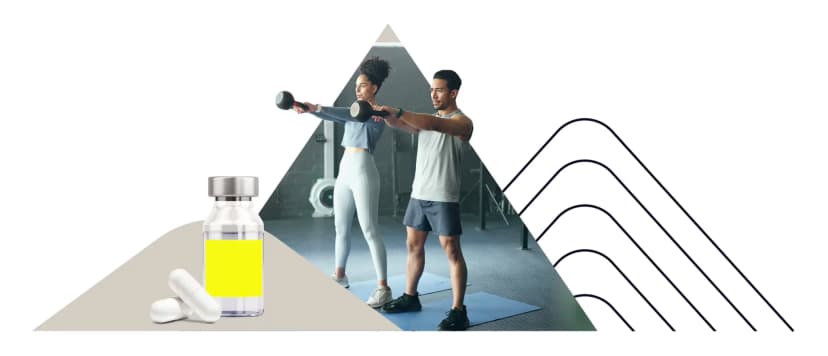Regular physical activity is one of the best ways to increase your lifespan. It not only helps you stay fit but also reduces the risk of many diseases. Exercise can make you feel younger and healthier by improving both your body and mind.
Key Takeaways
- Exercise can help you live longer by reducing the risk of chronic diseases.
- Different types of exercises like aerobic activities, strength training, and flexibility exercises are all important for longevity.
- A healthy diet complements exercise by providing the necessary nutrients and hydration.
- Setting realistic goals and finding enjoyable activities can make it easier to stick to an exercise routine.
- Other healthy habits like good sleep, social connections, and mental engagement also contribute to a longer life.
How Exercise Enhances Longevity
Cellular Benefits of Exercise
Regular physical activity can lead to significant cellular changes. Exercise helps maintain the length of telomeres, which are the protective caps on the ends of chromosomes. Longer telomeres are associated with slower aging and a lower risk of age-related diseases.
Reduction in Chronic Diseases
Engaging in daily exercise can reduce the risk of developing chronic diseases such as heart disease, diabetes, and certain cancers. This reduction in disease risk directly contributes to a longer, healthier life. Here are some benefits:
- Lower blood pressure
- Improved cholesterol levels
- Better blood sugar control
Impact on Mental Health
Exercise is not only beneficial for physical health but also for mental well-being. Regular physical activity can reduce symptoms of depression and anxiety, improve mood, and enhance cognitive function. This mental health boost can lead to a more fulfilling and longer life.
Incorporating regular exercise into your routine can significantly enhance both your physical and mental health, contributing to increased longevity.
Optimal Types of Exercise for Longevity
Aerobic Activities
Aerobic exercises are great for your heart and lungs. They help improve your endurance and can be done in many forms. Walking, swimming, and cycling are excellent examples of aerobic activities that are easy on your joints and can be done at any age.
Strength Training
Strength training helps build muscle and maintain bone density. This type of exercise is crucial as you age because it helps prevent falls and keeps you strong. You can use weights, resistance bands, or even your own body weight for strength training exercises.
Flexibility and Balance Exercises
Flexibility and balance exercises are important for keeping your body limber and preventing injuries. Activities like yoga and tai-chi not only improve your flexibility but also help you maintain your balance, which is essential for avoiding falls as you get older.
Remember, the best exercise is the one you enjoy the most. This makes it easier to stick with it and make it a part of your daily routine.
The Role of Diet in Complementing Exercise
Nutrient-Rich Foods
Eating nutrient-rich foods is essential for supporting your exercise routine. A balanced diet provides the energy and nutrients your body needs to perform at its best. Focus on consuming a variety of fruits, vegetables, whole grains, lean proteins, and healthy fats. These foods help repair muscles, replenish energy stores, and reduce inflammation.
Hydration and Exercise
Staying hydrated is crucial when you exercise. Water helps regulate your body temperature, lubricate your joints, and transport nutrients. Make sure to drink water before, during, and after your workouts. For longer or more intense exercise sessions, consider drinks that contain electrolytes to replace what you lose through sweat.
Timing of Meals and Workouts
When you eat can be just as important as what you eat. Eating a small meal or snack that includes carbohydrates and protein about 30 minutes to an hour before exercising can give you the energy you need. After working out, a meal rich in protein helps repair and build muscles. Proper meal timing can enhance your performance and recovery.
Combining a healthy diet with regular exercise maximizes the benefits of both and supports overall longevity.
Incorporating Exercise into Daily Life
Setting Realistic Goals
Starting small can make a big difference. Set achievable goals like walking for 10 minutes a day or taking the stairs instead of the elevator. Gradually increase your activity level as you become more comfortable.
Finding Enjoyable Activities
Choose activities you enjoy to make exercise feel less like a chore. Whether it's dancing, swimming, or playing a sport, having fun will keep you motivated.
Overcoming Barriers to Exercise
Life can get busy, but planning ahead can help. Treat your exercise time like an important appointment. If you miss a session, don't get discouraged—just get back on track the next day.
Making exercise a regular part of your life doesn't have to be hard. Small changes can lead to big results over time.
Additional Lifestyle Habits for Longevity
Importance of Social Connections
Maintaining strong social connections is crucial for a long and healthy life. People with strong social ties often live longer and healthier lives. Engaging with friends, family, and community can reduce stress and improve mental health.
Quality Sleep
Getting enough quality sleep is essential for overall health. Poor sleep can lead to various health issues, including heart disease and diabetes. Aim for 7-9 hours of sleep each night to support your body's natural healing processes.
Mental Engagement and Hobbies
Staying mentally active through hobbies and learning new skills can help keep your brain sharp. Activities like reading, puzzles, and playing musical instruments can improve cognitive function and reduce the risk of dementia.
Incorporating these habits into your daily routine can significantly enhance your quality of life and longevity.
Scientific Evidence Supporting Exercise for Longevity
Key Research Studies
Numerous studies have shown that regular physical activity can extend your lifespan. For instance, researchers at Brigham Young University found that the telomeres, which are the end caps on chromosomes that shorten with age, were longer in people who exercised regularly. This suggests that exercise can slow down the aging process at a cellular level.
Statistical Benefits
The statistical benefits of regular exercise are compelling. According to various studies, individuals who engage in consistent physical activity have a significantly lower risk of developing chronic diseases such as heart disease and cancer. Here's a quick look at some of the numbers:
| Health Benefit | Risk Reduction |
|---|---|
| Heart Disease | 30-40% |
| Cancer | 20-30% |
| Diabetes | 50% |
Expert Opinions
Experts agree that exercise is a key factor in promoting longevity. Dr. Amanda Ward, a well-known health expert, states that while exercise is crucial, it should be part of a broader lifestyle that includes a healthy diet, social connections, and mental engagement. "Exercise alone isn't enough; it's the combination of multiple healthy habits that truly makes a difference," she emphasizes.
Regular exercise not only helps you live longer but also improves the quality of your life. It keeps you physically fit, mentally sharp, and emotionally balanced.
Starting an Exercise Routine at Any Age
Beginner-Friendly Exercises
It's never too late to start exercising. Even if you've been inactive for years, you can still enjoy the benefits of physical activity. Begin with simple exercises like walking or gentle stretching. These activities are easy on the body and can be done by almost anyone.
Safety Tips for Older Adults
First, think safety. Walking and other low-impact exercises are generally safe for most people. However, if you have a history of heart disease or other medical conditions, check with your doctor before starting or changing your exercise routine.
Progressing Your Routine Over Time
Start small. You'll be more successful if you set the bar low. For example, start with a simple routine of walking 10 to 20 minutes three times per week. Every week or two, add five minutes per walk until you reach a goal of 30 minutes. Then, every week or two, add a day until you reach at least 150 minutes per week. Over time, you can try to increase intensity. Remember, small goals are more achievable, and these little victories will continue to fuel your motivation.
Even small amounts of exercise can make a big difference in your health and longevity.
Conclusion
Regular physical activity is one of the most effective ways to increase your lifespan. By incorporating moderate exercises like brisk walking into your daily routine, you can significantly reduce the risk of chronic diseases such as heart disease and cancer. Exercise not only helps in preventing these diseases but also brings about cellular changes that keep you younger. Additionally, staying active boosts your mood, improves sleep, and strengthens your immune system. Remember, it's never too late to start. Even small, consistent efforts can lead to a healthier, longer life. So, get moving and make exercise a part of your daily life to enjoy its numerous benefits.
Frequently Asked Questions
How does exercise help you live longer?
Exercise helps you live longer by reducing the risk of chronic diseases like heart disease and cancer. It also improves your overall health, making your body function better.
What types of exercise are best for longevity?
Aerobic activities, strength training, and exercises that improve flexibility and balance are all great for longevity. Each type offers different benefits to keep you healthy.
How much exercise do you need to increase your life expectancy?
You don't need to be an athlete to live longer. Just 150 minutes of moderate exercise like brisk walking each week can increase your life expectancy by several years.
Can diet really make a difference when combined with exercise?
Yes, a healthy diet complements exercise by providing the nutrients your body needs. Eating well can boost your immunity and lower the risk of chronic diseases.
Is it ever too late to start exercising?
No, it's never too late to start. Even older adults can benefit from beginning a regular exercise routine. Just make sure to start with beginner-friendly exercises and consult a doctor if needed.
What other habits support a long life?
Other habits that support longevity include maintaining social connections, getting quality sleep, and staying mentally engaged through hobbies or learning new things.























